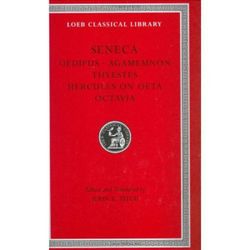

Oedipus, Agamemnon Thyestes Hercules on Oeta Octavia
Hardback
Publication Date: 22/06/2004
Seneca is a figure of first importance in both Roman politics and literature: a leading adviser to Nero who attempted to restrain the emperor's megalomania; a prolific moral philosopher; and the author of verse tragedies that strongly influenced Shakespeare and other Renaissance dramatists. This volume completes the Loeb Classical Library's new two-volume edition of Seneca's tragedies. John Fitch's annotated translation, which faces Latin text, conveys the force of Seneca's dramatic language and the lyric quality of his choral odes. Seneca's plots are based on mythical episodes, in keeping with classical tradition. But the political realities of imperial Rome are also reflected here, in an obsessive concern with power and dominion over others. The "Octavia" is our sole surviving example of a Roman historical play; set at Nero's court, it was probably written by an admirer of Seneca as statesman and dramatist.
- ISBN:
- 9780674996106
- 9780674996106
- Category:
- Literary studies: plays & playwrights
- Format:
- Hardback
- Publication Date:
- 22-06-2004
- Language:
- English, Latin
- Publisher:
- Harvard University Press
- Country of origin:
- United States
- Pages:
- 560
- Dimensions (mm):
- 170x121x34mm
- Weight:
- 0.46kg
Click 'Notify Me' to get an email alert when this item becomes available
Great!
Click on Save to My Library / Lists
Click on Save to My Library / Lists
Select the List you'd like to categorise as, or add your own
Here you can mark if you have read this book, reading it or want to read
Awesome! You added your first item into your Library
Great! The fun begins.
Click on My Library / My Lists and I will take you there
Click on My Library / My Lists and I will take you there
Reviews
Be the first to review Tragedies: Oedipus.


Share This Book: